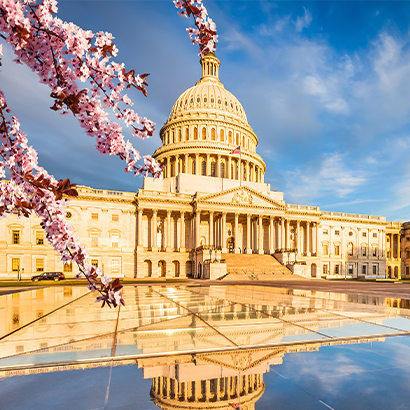
White Collar Defense and Investigations: U.S. Congressional Investigations
Congressional investigations continue to proliferate as a means of informing legislation, shaping the policy environment, and building legislators’ profiles. Increasingly, both major political parties are scrutinizing the private sector. Our bipartisan Congressional Investigations team brings a wealth of experience on investigating Senate and House committees, at the Department of Justice, and in the White House Counsel’s Office. We have represented companies, tax-exempt organizations, and individuals as they respond to inquiries from Congress, inspectors general, and the Department of Justice in high profile, politically charged matters.
Congress’s power to investigate is sourced to the Constitution as an aid to the legislative function. However, Congressional investigations at times are used to accuse and embarrass those called, while also building support for a member’s political brand or agenda. These investigations can create significant legal, reputational, and policy risks.
Congressional investigations raise unique issues when compared to agency investigations and enforcement actions. One cannot always rely on assurances of confidentiality. Congress contests certain privilege doctrines that are reliable in judicial proceedings. There is no judge to referee disputes about document requests unless and until negotiations with a committee break down much later in the process and spill into a subpoena or contempt litigation. Effective strategies and responses can mitigate, and at times eliminate, risks. Understanding the substance of the law and facts under review are essential, but so is understanding the members involved committees involved, their priorities, their political districts and pressures.
It is essential to have skilled counsel help you navigate the complexities, procedures, personalities, and politics involved.
We Have the Team to Help
Our team has handled over 100 congressional investigations covering just about every industry. We provide full spectrum, bipartisan congressional oversight and investigations services to clients across our global platform. Our lawyers and government affairs professionals collectively have hundreds of years of congressional experience on both sides of the witness table, including members of Congress and committee counsel who have chaired, organized, and run dozens of hearings, as well as lawyers with experience representing the White House and other executive branch agencies in major congressional investigations. Our team includes policy professionals and lawyers who have deep substantive experience across numerous practice areas—government enforcement, white collar crime, financial services, energy, environment, health care, technology, procurement, banking, educational institutions, nonbank lenders, and others. We regularly advise lawyers and lobbyists with other firms who need assistance with congressional investigations and hearings.
Our Public Policy and Law and White Collar Defense and Investigations practices have consistently been recognized by leading legal directories across the globe. These assessments acknowledge that our professionals work across disciplines to combine legal rigor, extraordinary service, substantive knowledge of the issues, political acumen, industry understanding, and depth and breadth of bipartisan relationships with government officials.
Congressional investigations do not operate in a vacuum.
They often involve concurrent investigations by other federal agencies, such as the US Department of Justice, Government Accountability Office (GAO), and inspectors general, state attorneys general, or the US Securities and Exchange Commission (SEC). In some cases, congressional investigations will result in parallel agency investigations and enforcement actions. In other cases, Congressional investigations are reactions to known enforcement efforts by agencies. It is also not uncommon for a committee to request the GAO or an inspector general to conduct the investigation as an extension of Congressional power to investigate.
Congressional investigations and hearings are always high-risk and often high-profile.
They must be taken very seriously. The reputational risk to both the company and individual executives is significant, including the danger that information from the investigation will be used in parallel criminal, regulatory enforcement, or private civil litigation. All too often, confusion or lack of preparation results in collateral accusations of lying or misleading Congress.
Congressional investigations and hearings are political events.
Although often billed as an effort to investigate and inform, they may also have the dual purpose of accusing and embarrassing those called, while also building support for a member’s political agenda. Understanding the political incentives at issue is essential to successful navigation of these treacherous investigative waters.
- <
- 1
- >

